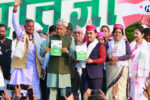Are sovereign citizens the source of national power? The constitution of Nepal, 2015, starts with: “We, the people of Nepal, in the exercise of the sovereign powers inherent in us,…”.
If that is the case, what role do geography and demography play in national power? In the case of Nepal, the source of national power is not limited by geography or demography; historical, cultural, religious traditions, and other factors all play a role in balancing the Nepali national source of power.
When we debate or argue about Nepali geopolitical complexities and critical interests, the great King PN Shah’s “Divine Doctrine” is treated as the binding document.
Determining the national interests of a multi-ethnic, multi-lingual, and multi-religious country like Nepal is a difficult task.
The Divya Upadesh has produced several characteristics that justify Nepal’s status as a nation-state in an evolving global political culture.
The constitution is the country’s supreme law and a political-legal framework. Nepal has a long and illustrious history of constitutional and political growth.
Many scholars argue that national interests encompass a variety of needs and demands that change over time due to social, cultural, religious, natural ecology, geopolitics and worldviews, among other factors.
Citizenship in the global political environment is both a source of national pride and a source of national interest. Rebasing and reprioritizing (readjusting) the public interest is common practice in national security.
Internal and external threats/risks/challenges have caused the readjusting of the national interest’s foundations.
Every nation’s permanent vital interests are to be safeguarded and promoted, including sovereignty, national unity, territorial integrity, and democracy.
The state develops a security policy, also known as a “national security policy (NSP)” and a “national security strategy (NSS),” as well as other policies as required, to promote and protect this national interest.
National security, in general, refers to the safeguarding of national interests against internal and external threats and challenges.
NSS, on the other hand, is concerned with “how a nation-state secures, protects, and promotes its national interests in the light of current threats and challenges.”
Similarly, the constitution’s preamble has attempted to integrate these principles as the foundations of Nepali national interest: “… to preserve and foster harmony in diversity, social and cultural cohesion, equality and harmonious attitude…”
The preamble further read as ‘..by adopting democratic norms and values, including people’s competitive multi-party democratic governance system, civil liberty, fundamental rights, human rights, adult franchise, periodic elections, complete press freedom and an independent, impartial and competent judiciary, and the concept of rule of law…’ as securing the universal democratic global interests.
In Nepal, the practice of formulating national security-related policies and devising successful strategies is a relatively new phenomenon. These phenomena have also been referred to as “top-down, irrelevant, ad hoc policies.”
The constitution is the country’s supreme law and a political-legal framework. Nepal has a long and illustrious history of constitutional and political growth.
These reforms were glorified in order to satisfy citizens’ aspirations for eternal peace, good governance, growth, prosperity, and so on.
The inherent characteristic of a democratic system is political upheaval. But the thing to watch with each political shift (regime change) is the political leader’s vulnerability to the sequencing/reverse sequencing or (ignorance) to identify/prioritize the national interest/s, which will ultimately decide true national unity in securing the national interest/s.
In Nepal, the practice of formulating national security-related policies and devising successful strategies is a relatively new phenomenon. These phenomena have also been referred to as “top-down, irrelevant, ad hoc policies.”
For instance, in 2016, the then-government of Nepal formulated the National Security Policy (NSP) for the first time in Nepal’s history.
This policy was replaced by the new NSP on March 18, 2018, which was approved by the current government headed by K.P Sharma Oli.
According to the government, the current national security strategy was introduced to resolve federal interests and tackle threats promptly.
However, due to its classification as classified, no one is aware of the new security strategy on how national vital interests are classified, secured, and promoted.
The guiding doctrine is national security policy, and other policies such as foreign, fiscal, and defense are all linked to security policy.
In this situation, Nepal’s national interest/s must be a synthesis of the vital interests of local, provincial and federal governments that meet citizens’ aspirations.
As a result, every Nepalese was excluded from the debate and discussion about defining and prioritizing national interests. Likewise, security organizations and departments were torn between their specific roles and obligations. I’m hoping that the current NSP has answered these concerns.
What should be the security vision of the country?
What are the main security interests, and which ones should be given high priority?
What is the general nature of the internal/external security environment?
What are the security threats, risks, and challenges?
Which security institutions and agencies should have the lead roles in the implementation of NSS, and which should have supporting roles?
What should be the role and responsibilities of a National Security Council (NSC) and how should such a council be composed?
Finally, a geopolitically sensitive country like Nepal needs a vibrant NSC and up-to-date NSP to tackle internal and external security threats.
In this situation, Nepal’s national interest/s must be a synthesis of the vital interests of local, provincial and federal governments that meet citizens’ aspirations.
Similarly, the national security policy should represent the critical balancing of each country’s interests. I believe that by doing so, we will be able to recognize and promote/protect Nepal’s national source of strength.








Comment